Key takeaways:
- Understanding and addressing the unique health needs of elderly individuals, including physical, emotional, and social aspects, is essential for their overall well-being.
- Proper nutrition plays a crucial role in elderly health, requiring personalized dietary plans to enhance energy levels and manage chronic diseases.
- Creating a supportive living environment and engaging community resources significantly improve the quality of life for seniors, fostering social connections and access to necessary services.
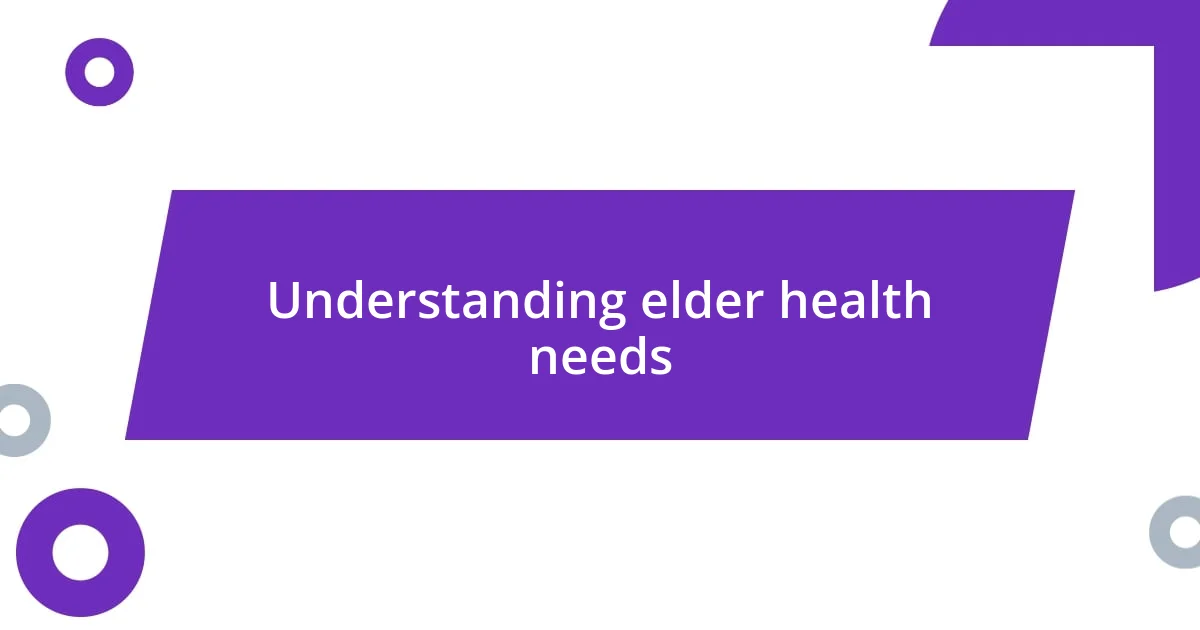
Understanding elder health needs
Understanding the health needs of elders is crucial, as their requirements can be quite different from those of younger adults. I remember visiting my grandmother in her nursing home, where I observed how personalized care made all the difference for her and her fellow residents. Have you ever noticed how a simple interaction can brighten someone’s day? That’s the kind of attention that older adults not only need but thrive on.
I’ve found that many elderly individuals face unique challenges, such as chronic health conditions or mobility issues. For instance, while volunteering in a local community health center, I learned that medication management becomes particularly important as we age. How often do we consider how one mismanaged pill can lead to a cascade of health problems? It’s a sobering thought that highlights why we must prioritize tailored approaches to elder care.
Moreover, emotional well-being plays a pivotal role in elder health, yet it’s often overlooked. I can recall a heartfelt moment when an elderly man shared how loneliness affected his health more than his physical ailments. Doesn’t it seem essential that we address these emotional aspects alongside physical care? By fostering connections and creating supportive environments, we can profoundly impact the overall health of our seniors.
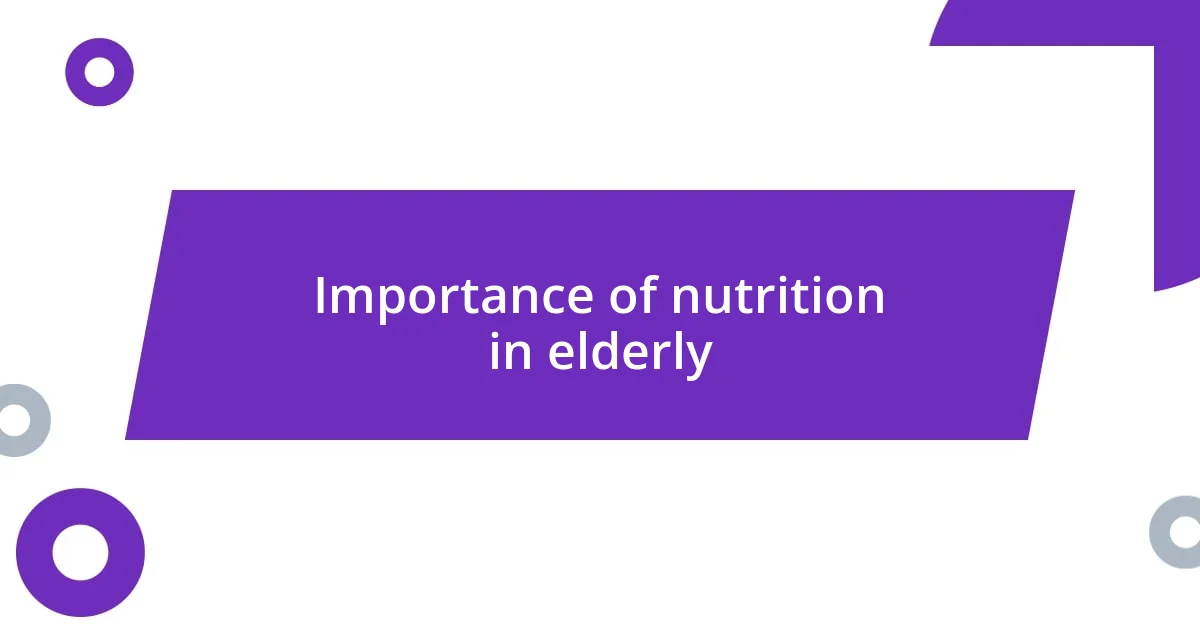
Importance of nutrition in elderly
Nutrition holds a vital role in maintaining the health of elderly individuals, influencing everything from energy levels to chronic disease management. I recall a conversation with a nutritionist who emphasized that proper dietary choices can significantly improve the quality of life for seniors. It’s fascinating to see how a single healthy meal can uplift their spirits and enhance their overall well-being.
Consider the following key aspects of nutrition in elderly care:
– Balanced Diet: A mix of fruits, vegetables, lean proteins, and whole grains is essential for maintaining strength and energy.
– Hydration: Many seniors forget to drink enough water, leading to dehydration, which can severely impact health.
– Nutrient Needs: As we age, the body may require more of certain nutrients, such as calcium and vitamin D, to support bone health.
– Social Connection: Sharing meals can reduce feelings of isolation, promoting not just good nutrition but also emotional health.
– Custom Diet Plans: Individualized nutrition plans are key to addressing specific medical conditions, like diabetes or heart disease.
Reflecting on my time helping at a community kitchen, I witnessed the joy on seniors’ faces when they were served dishes tailored to their dietary needs. It’s moments like these that truly highlight the connection between nutrition, happiness, and health in the elderly.
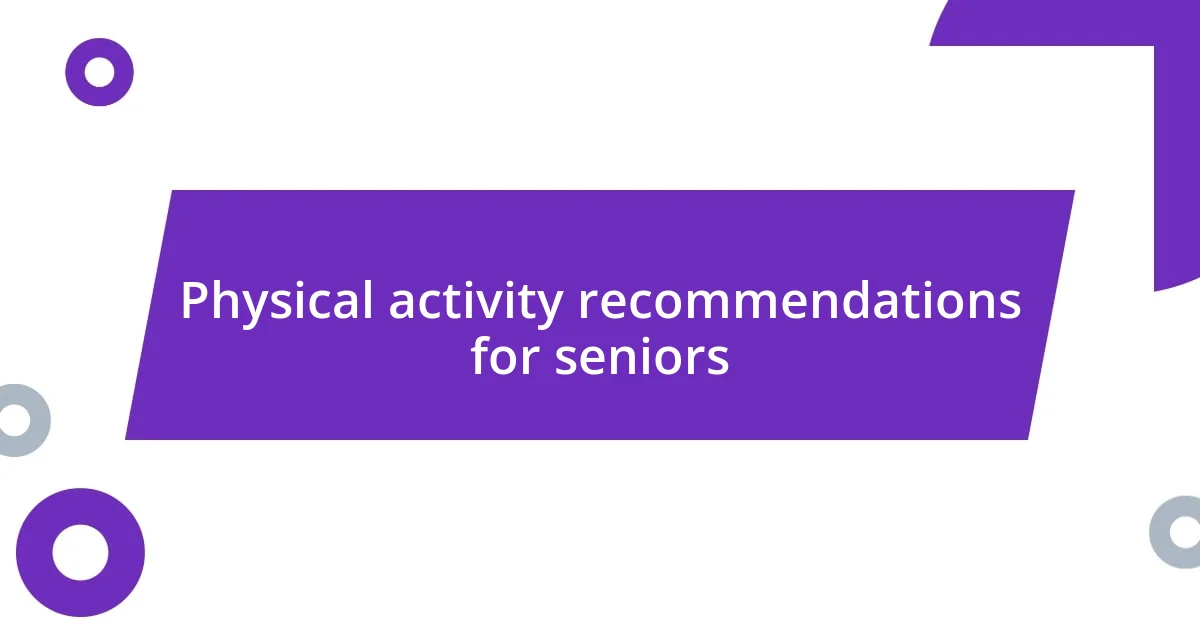
Physical activity recommendations for seniors
Physical activity is a cornerstone of health for seniors, significantly enhancing their quality of life. In my experience as a volunteer at a senior fitness class, I was amazed to see how even light exercises like stretching or walking can make such a difference. It’s heartening to watch someone who walks slowly bloom with confidence after just a few simple mobility exercises. Have you ever noticed how movement can spark joy in people?
Engaging seniors in regular physical activity should be adapted to their capabilities and preferences. I remember chatting with an elderly neighbor who shared how she loved water aerobics; it not only helped her strength but also offered a delightful social outlet. It’s powerful to realize that the method of exercise can be just as impactful as the activity itself. Accessible options include gentle yoga, tai chi, and leisurely strolls.
Tailoring workouts to match their health status makes a world of difference. The most rewarding moment for me was when a coordinator led a hula-hooping session, unveiling laughter and nostalgic memories among the participants. Isn’t it remarkable how movement can evoke joy and elevate spirits while promoting better health? Regular activity can help manage disease, enhance mobility, and even boost cognitive function—it’s truly a win-win for our seniors.
| Type of Activity | Benefits |
|---|---|
| Walking | Enhances cardiovascular health and increases energy. |
| Chair Yoga | Improves flexibility and reduces stress. |
| Water Aerobics | Provides low-impact exercise that supports joint health. |
| Tai Chi | Boosts balance and mental focus through slow, controlled movements. |
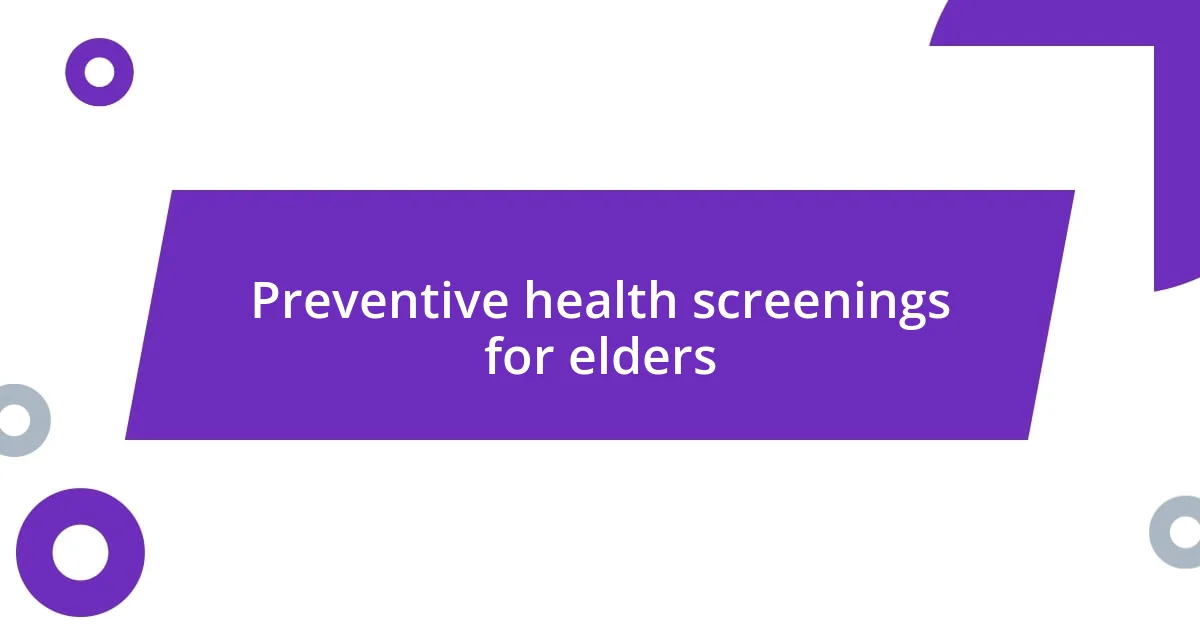
Preventive health screenings for elders
Preventive health screenings are crucial for our elders, offering an opportunity to catch potential health issues before they escalate. I recently accompanied my grandmother to her annual check-up, and witnessing the thoroughness of the screening process really struck me. Every test seemed purposeful, addressing everything from blood pressure to cholesterol levels—it’s remarkable how a simple appointment can reveal so much about one’s health.
I often recall the story of a friend whose father was diagnosed with high blood pressure during a routine screening. It was a wake-up call for their whole family and led to lifestyle changes that improved not only his health but also encouraged everyone to be more proactive. This experience reaffirmed my belief that preventive screenings can be transformative; they not only identify risks early but also empower seniors to take control of their health. Have you had a similar experience that changed your perspective on health assessments?
Moreover, the emotional weight of being proactive about health shouldn’t be underestimated. When I think back to conversations with my elderly neighbors about their screenings, there’s often a mix of anxiety and relief. It’s as if they share a tacit understanding that facing these health checks, while daunting, often leads to reassurance. Being proactive isn’t just about health metrics; it fosters hope and nurtures connectedness among family and community members who care deeply for their elders.
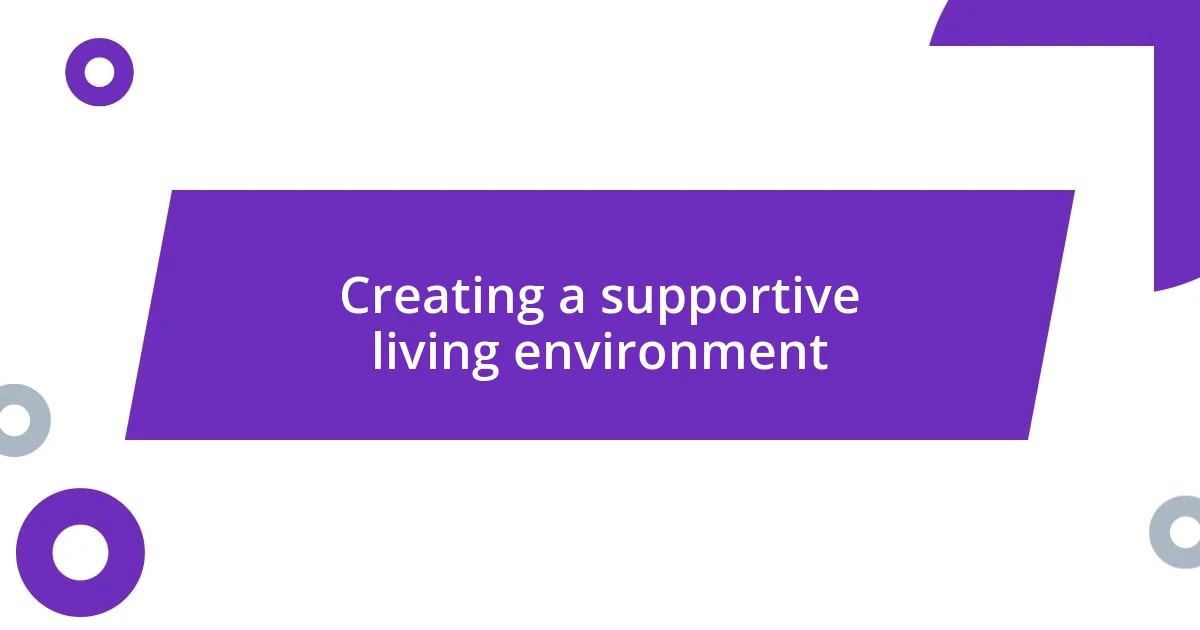
Creating a supportive living environment
Creating a supportive living environment is fundamental for healthy aging. I recall visiting an elderly friend’s home, and the atmosphere struck me immediately—bright lighting, accessible furniture, and personal touches that showcased her life. It made me think about how small changes, like ensuring clear walkways or using non-slip mats, can significantly enhance safety and comfort. Have you ever noticed how a well-organized space can uplift someone’s spirit?
I remember helping my aunt rearrange her living room. We created cozy nooks where she could read or simply gaze out the window. The transformation was remarkable—she felt more at home and less isolated. It’s fascinating how the right environment can truly enhance one’s mood and sense of independence. Encouraging personal expressions, like displaying family photos or mementos, can spark joy and connection to their past.
Another important aspect is fostering social interaction. When I set up a weekly game night with some local seniors, the energy in the room shifted. They laughed, shared stories, and supported each other. It reminded me that a lively social space, filled with opportunities for interaction, not only combats loneliness but also promotes mental health. Isn’t it incredible how sharing moments together can create a vibrant community?
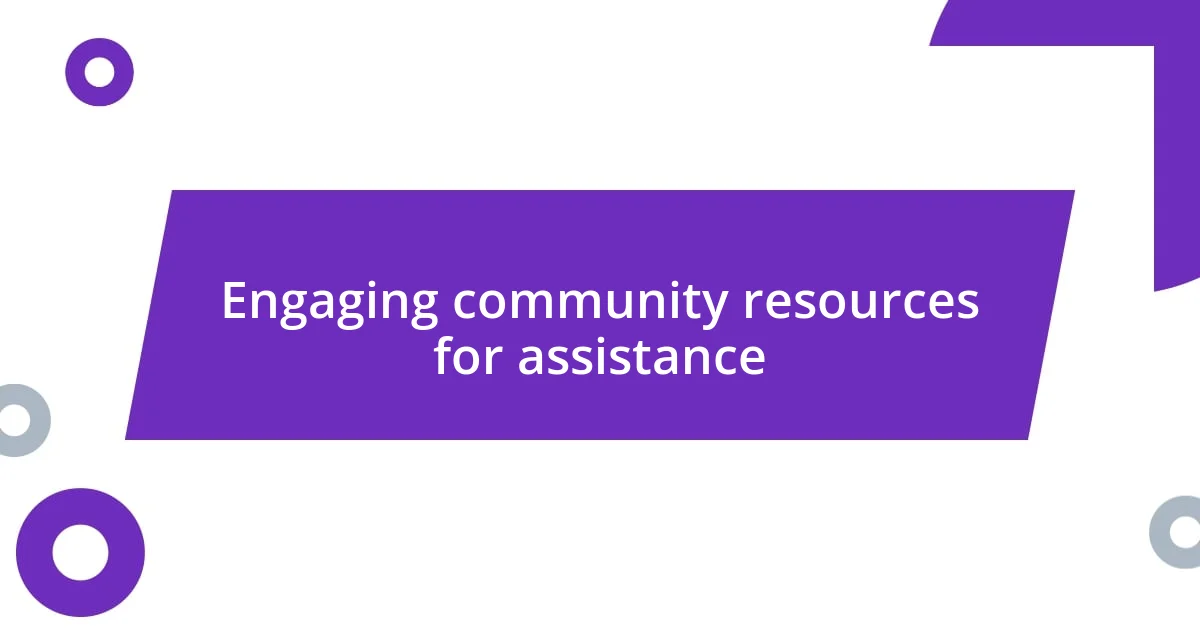
Engaging community resources for assistance
Engaging community resources for assistance is a game changer for elder health. I once volunteered at a local senior center where we organized fun and educational workshops on everything from nutrition to exercise. There was an elderly gentleman who initially hesitated to join; however, after a little encouragement, he not only participated in the activities but also formed friendships that brightened his days. Don’t you think it’s amazing how social connection can rejuvenate the spirit?
I vividly recall a moment when a neighbor reached out to a community health worker for help with transportation to medical appointments. The difference was palpable—she no longer felt isolated by her mobility challenges. These resources can make a monumental impact on seniors’ ability to access services they need. Have you ever experienced a time when a community connection made your tasks feel lighter and more manageable?
Collaborating with local organizations, like Meals on Wheels or home health agencies, can profoundly benefit our elders. When I helped coordinate meal delivery for a couple in my area, they expressed not just gratitude for the meals but for the daily visits that brought cheer into their home. It made me realize that community engagement doesn’t just provide basic services; it nourishes the soul. Wouldn’t it be wonderful if every elder felt the warmth of community support in their lives?














